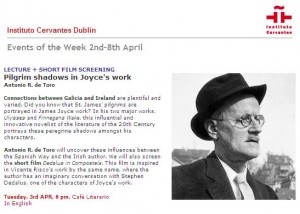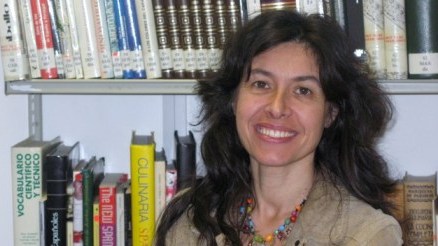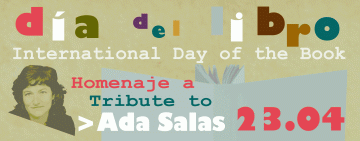Blog del Instituto Cervantes de Dublín
Torre Martello
Ven a celebrar el Día Mundial del Libro / Come to celebrate World Book Day with us
El día 23 celebramos el Día Mundial del Libro con un recital concurso con nuestros alumnos y un homenaje a la poeta Ada Salas, que recitará sus poemas junto a la poeta irlandesa Leeanne Quinn
¿Estudias con nosotros? Entonces puedes participar en nuestro concurso y ganar un viaje a Málaga (dos noches, incluidos vuelos, con habitación doble con desayuno) o un curso de español gratis.
El 23 de abril es una fecha simbólica para el mundo literario. En 1916, ese mismo día, murieron Cervantes, Shakespeare e Inca Garcilaso de la Vega. Por ello el 23 de abril es la fecha establecida por la UNESCO para celebrar el Día Internacional del Libro y los Derechos de Autor y promocionar la lectura y la edición. Este día se celebra desde 1995.
Para conmemorar este día, el Instituto Cervantes organiza un recital concurso abierto entre los alumnos del centro en homenaje a un poeta contemporáneo. Este año, los textos seleccionados pertenecen a la poeta Ada Salas, a quien le rendimos un merecido homenaje.
Tras el concurso, continuaremos con el recital poético A dos voces, en el que podremos escuchar poemas de Ada Salas (España) y Leeanne Quinn (Irlanda).
Ada Salas nació en Cáceres en 1965. Es Licenciada en Filología Hispánica por la Universidad de Extremadura.
En 1987 recibió el Premio Juan Manuel Rozas de poesía con Arte y memoria del inocente (1988). Su libro Variaciones en blanco (1994) obtuvo el IX Premio Hiperión. En 1997 publicó La sed, y en el 2003 Lugar de la derrota (ambos libros en Hiperión). En ese mismo año aparece Noticia de la luz (Escuela de Arte de Mérida).
En 2005 edita un libro de prosas: Alguien aquí. Notas acerca de la escritura poética (Hiperión). En 2008 Esto no es el silencio (Hiperión) obtiene el XV Premio Ricardo Molina– Ciudad de Córdoba. No duerme el animal (Hiperión, 2009) reúne sus cuatro primeros libros. En colaboración con el pintor Jesús Placencia ha publicado Ashes to Ashes (2010, Editora Regional de Extremadura).
En 2011 ha aparecido su ensayo El margen, el error, la tachadura. Notas acerca de la escritura poética (Diputación de Badajoz), Premio de Ensayo Fernando Pérez 2010. Junto con Juan Abeleira ha traducido A la Misteriosa y Las tinieblas de Robert Desnos.
Leeanne Quinn es oriunda de Drogheda y reside en Dublín. Se licenció en Literatura Inglesa por la University College Dublin en 2001. Un año más tarde finalizó el master en Romanticismo, Modernismo y Postmodernismo de la University College de Cork. Actualmente está realizando un doctorado sobre las novelas de Philip Roth. Su primera antología de poemas, Before you, fue publicada por Dedalus Press en septiembre de 2011.
Are you studying with us? Then you can participate at our Poetry competition and win a trip to Malaga or a 30 hour summer course!
April 23 is a symbolic date for world literature. On this date, in 1616, Cervantes, Shakespeare and Inca Garcilaso de la Vega died. The World Book Day (also known as the International Day of the Book) is a yearly event on April 23, organised by UNESCO to promote reading and publishing. The Day was first celebrated in 1995.
To commemorate this day Instituto Cervantes is organising a recital contest. This year the poems will be by Ada Salas.
If interested, talk to your teacher and get all the information about this event at the reception desk.
After the contest, as part of the celebrations of the World Book Day, Instituto Cervantes Dublin gathers Spanish poet Ada Salas and Irish poet Leeanne Quinn in a In two voices poetry reading.
Ada Salas (Cáceres, Spain, 1965) graduated in Spanish Philology at University of Extremadura. In 1987 she was awarded the Juan Manuel Rozas poetry prize for her book Arte y memoria del inocente (1988). Her book Variaciones en blanco (1994) was awarded the 9th Hiperión Prize. In 1997 she published La sed and in 2003 Lugar de la derrota (both by Hiperión publishing house). On the same year Noticia de la luz was released by Escuela de Arte de Mérida.
In 2005 she publishes the narrative compilation Alguien aquí. Notas acerca de la escritura poética (Hiperión). In 2008 her book Esto no es el silencio (Hiperión) was awarded the 15th Ricardo Molina – Ciudad de Córdoba prize. No duerme el animal (Hiperión, 2009) gathers her first four books. In 2010 she publishes Ashes to Ashes in collaboration with painter Jesús Placencia (Editora Regional de Extremadura).
In 2011 her essay El margen, el error, la tachadura. Notas acerca de la escritura poética (Diputación de Badajoz) was publised and awarded the Fernando Pérez Essay Prize 2010. She has translated A la Misteriosa and Las tinieblas, by Robert Desnos, together with Juan Abeleira.
Leeanne Quinn is originally from Drogheda and lives in Dublin. She studied English Literature in University College Dublin, gaining her B.A. (Hons) 2001. She went on to take an M.A. in Romanticism, Modernism and Postmodernism at University College Cork in 2002. She is currently completing a Ph.D. thesis on the fiction of Philip Roth. Her first collection of poetry, Before You, was published by Dedalus Press in September 2011.
Las sombras del peregrino en la obra de Joyce / Pligrim shadows in Joyce’s work

Lamentamos comunicarles que la actividad “Sombras peregrinas en la obra de James Joyce”, prevista para hoy 3 de abril a las 18h en el Café Literario ha sido cancelada.
Rogamos disculpen las molestias.
We are sorry to inform you that the Lecture + Film Screening “Pilgrim shadows in Joyce work”, scheduled to take place today April 3rd at 6pm at Café Literario, has been canceled.
We apologize for any inconvenience caused.
Las conexiones entre Galicia e Irlanda son abundantes y variadas. ¿Sabías que los peregrinos de Santiago son retratados en la obra de James Joyce?
En sus dos obras principales, Ulises y Finnegans Wake, el novelista más influyente e innovador de la literatura del siglo XX dibujó las sombras de los peregrinos entre sus personajes.
Antonio R. de Toro se detendrá en su conferencia a analizar las influencias entre el Camino de Santiago y el autor irlandés.
Durante la velada, se proyectará también el cortometraje Dedalus en Compostela. Esta película está inspirada en la obra de Vicente Risco con el mismo nombre, donde el autor tiene una conversación imaginaria con Stephen Dedalus, uno de los personajes de la obra de Joyce.
Conferencia + proyección de cortometraje.
Martes, 03 de abril, 6 pm. Café Literario
En Inglés
Connections between Galicia and Ireland are plentiful and varied. Did you know that St. James’ pilgrims are portrayed in James Joyce work?
In his two major works, Ulysses and Finnegans Wake, this influential and innovative novelist of the literature of the 20th Century portrays these peregrine shadows amongst his characters.
Antonio R. de Toro will uncover these influences between the Spanish Way and the Irish author.
We will also screen the short film Dedalus in Compostela. This film is inspired in Vicente Risco’s work by the same name, where the author has an imaginary conversation with Stephen Dedalus, one of the characters of Joyce’s work.
Lecture + Short film Screening.
Tuesday, 3rd APR, 6 pm. Café Literario
In English
Interview with Anamaría Crowe Serrano
Anamaría Crowe Serrano: What I want to do in my poetry is explore language

Interview with Anamaría Crowe Serrano held on 31st May 2011 at the Dámaso Alonso Library of the Instituto Cervantes in Dublin on the occasion of her participation in the round table discussion “More than poetry”, with Diego Valverde Villena.
Anamaría Crowe Serrano is a writer and lives in Dublin. She teaches Spanish language and translates Spanish and Italian contemporary poetry into English. In addition to her English translations of Mexican poets Gerardo Beltrán and Elsa Cross (Selected Poems, Shearsman, 2010) she has also published translations into Spanish of the Irish poets Seamus Heaney and Brendan Kennelly. As a poet, she is the author of a collection titled Femispheres (Shearsman, 2008).
Pilar Garrido: —Anamaría Crowe Serrano is an Irish poet and translator. Your second surname is Spanish. What part of Spain is your mother from?
Anamaría Crowe Serrano: —My mother is from Zaragoza, but I also have family in Bilbao. My mum came to Ireland about 40 years ago to study English, and she stayed and married my father. My first surname, Crowe, comes from my father.
Pilar Garrido: —What would you highlight from your work as a poet?
Anamaría Crowe Serrano: —For me, there are two key aspects to poetry: there’s the theme, what you want to express and, equally important, the way you express it, the way you manipulate language, how you create sound effects and how you can produce something original and creative with language. For me, that’s absolutely essential in poetry, sometimes it’s even more important than the theme.
Pilar Garrido: —When and how did you start writing poems?
Anamaría Crowe Serrano: —I started quite young. When I was 11 I had an inspiring teacher at school who instilled a huge love of writing in me. That continued in college. As my degree was in French and Spanish Language and Literature I studied poetry and loved it. I started writing poems, inspired at that time by the Latin American and French surrealists.
Pilar Garrido: —At that early age of 11, did you write in English or Spanish?
Anamaría Crowe Serrano: —I always write in English. Actually, I have a better command of English than Spanish, even though my Spanish is good but it’s more natural for me to write in English because I’ve always lived in Ireland. I’ve written maybe four or five poems in Spanish but I’ve never read them in public.
Pilar Garrido: —Which poet or poets have influenced you?
Anamaría Crowe Serrano: —There are lots. As a child, more than poetry it was Oscar Wilde’s short stories which I adored. Later on, as I was saying, at university I discovered the surrealists who have remained a constant influence. And then, when I left college, I took up Joyce whom I had never studied before. Joyce is always with me as a point of reference. I also love Cervantes’ Don Quixote. It’s a fabulous book, and while it’s not poetry, it is very poetic.
Pilar Garrido: —As we are in a country of writers, poets, musicians… who are your favourite Irish authors?
Anamaría Crowe Serrano: —In terms of poetry, my favourite is Eiléan Ní Chuilleanáin, who writes in English although she has an Irish name. Her work is really beautiful. I also like Yeats. I discovered Yeats many years ago and was fascinated by him. Heaney, of course, is so lyrical as well… But I also like the experimental poets, whose poetry is more contemporary, more edgy, and it does just what I want to do in my own poems, explore language. For example, there’s a poet who lives in Cork called Trevor Joyce, whose writing is really good.
Pilar Garrido: —You have also written short stories. Which one would you highlight?
Anamaría Crowe Serrano: —I wrote the short stories a long time ago, I hardly remember them. Maybe if I was to pick one it would be “The Barber’s Shop” about the life of a castrato, set in the times of these singers, the castrati. Their parents would sell them to the Church to be trained as musicians. Sometimes these children didn’t know they had been castrated until they were adults and they didn’t develop in the normal way. I was fascinated by that and wrote a story about it. Obviously, it’s a story about a fictitious child.
Pilar Garrido: —You’re a poet and also a translator. What kind of translations do you do?
Anamaría Crowe Serrano: —I usually translate poetry, mostly from Italian into English, but I’ve also translated from Spanish into English. Most of the Italian contemporary poetry I translate is by living poets, so I can always contact them if I have any doubts or queries. For me, it’s very important to be able to collaborate with the poet. As you know, there are so many ways to interpret a poem. Sometimes you might not understand it even if it’s in your native language. That’s why I believe it’s important to consult with the poet, whenever possible.
Pilar Garrido: —I imagine the two roles are very inter-related.
Anamaría Crowe Serrano: —Absolutely. I think it’s almost essential to be a poet in order to translate poetry. And poets usually prefer to be translated by another poet because you’re familiar with poetic techniques, the solutions that can be found for difficult turns of phrase. You might also have a sharper ear, sensitive to the sound and rhythm of poetry.
Recommended links
- [Video] Interwiew with Anamaría Crowe Serrano at the Instituto Cervantes in Dublin by Pilar Garrido
- [Audio] “El bilingüismo, una manera de sentir”. Interview with Anamaría Crowe Serrano in CanalUNED.
- Anamaría Crowe Serrano’s profile on Shearsman Books.
- One columbus leap by Anamaría Crowe Serrano.




